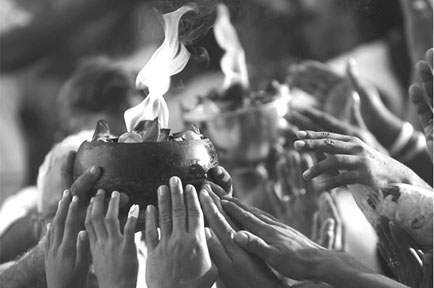|
Tomorrow is Vap Full Moon Poya Day:
Buddhist perspective of real happiness
By Lionel WIJESIRI
Tomorrow is Vap Full Moon Poya Day. It marks the offering of the
Katina Cheevara or new robes to Bhikkhus who observed ‘Vas’ from Esala
to Vap.
The other significant events commemorated during this month are the
conclusion of the Buddha’s preaching of the Abhidhamma for three months
to His mother in the Heavenly Realm (Devaloka) and King Devanampiyatissa
of Sri Lanka sending envoys to Emperor Asoka of India, requesting him to
send his daughter Arahat Sanghamitta Theri to Sri Lanka to establish the
Bhikkhuni Sasana.
 |
|
Religious rituals being
conducted at a temple on Poya day |
On this significant day, let us reflect upon a perennial question
many scholars throughout the Western world were contemplating for the
past five decades. ‘What is real happiness?’
Meaningful life
All of us seek happiness. If I ask you why you seek happiness, your
answer would be “I want to lead a meaningful life.” Herein we come
across the problem; interpretation of the word ‘meaningful’.
A meaningful life does not depend on your bank account, the behaviour
of your spouse, your job or your salary. A meaningful life must answer a
simple question, “What have I brought to the world?” If you can look at
a day and see that virtue, happiness, truth and living an altruistic
life are prominent elements, you can say “You know, I’m really a happy
camper”.
One of my former employees has a rare disease, and every week he goes
to the hospital for dialysis and drug treatment, and will for the rest
of his life. You could say, “Well, that’s a tragedy, a dismal
situation.” However, the last time I spoke with him, he said, “Look, I’m
flourishing.” And he was. He was finding a way within the very limited
parameters of what was available to him. His mind is clear. He’s
reading, he’s growing, he’s meditating, and he’s teaching meditation to
other terminally ill patients in his hospital. He’s living a very
meaningful life in which he can honestly say that he is happy.
The good news is that genuine happiness is not out there in the
marketplace, to be purchased or acquired from the best teacher around.
One of the best kept secrets is that the happiness we’re striving for so
desperately in the perfect spouse, the great children, the fine job,
security, excellent health, and good looks has always been within and is
just waiting to be unveiled.
Knowing that what we are seeking comes from within changes
everything. It doesn’t mean you won’t have a spouse, or a car, or a
satisfying job, but if you’re flourishing, your happiness won’t depend
so much on external events, people and situations, which are all beyond
your control.
Kusala Kamma
Buddhism has no concept equivalent to that of sin. While there may be
gods in Buddhism, there is no Creator God and Judge. In Buddhism,
actions are judged by their utilitarian value: Whether they lead to
greater happiness for the person and affect others, and whether they
lead to better karma, rebirth, and progress on the path to
Enlightenment.
The Buddhist terms for judging whether actions have a felicitous or
infelicitous effect are kusala and akusala, which usually gets
translated as wholesome and unwholesome, or skilful and unskilful. The
utilitarian nature of the concepts is made clear in the Kusala Sutta
(Anguttara Nikaya 2.19):
An action characterised by kusala kamma, which are wholesome,
skilful, good, meritorious, is bound to result (eventually) in happiness
and a favourable outcome. Actions characterised by its opposite (akusala
kamma) lead to sorrow.
When we say that skilful and meritorious actions promote happiness,
we are not just talking about the happiness of the individual. In
Buddhism, the individual and others in the community have equal claims
to happiness. Buddhism is neither individualist nor collectivist, but
represents a middle way between these dialectical opposites.
Selfish behaviour does not bring genuine happiness, but only fleeting
sense pleasures and ego gratification. Selfishness disturbs our loving
social ties with others, creates dissension in the community, and makes
us slaves to the hedonistic treadmill of transient pleasure.
The Buddha believed that real happiness came from the cultivation of
wisdom and character. Aristotle differentiated eudamonia, or genuine
well-being, from hedonia, or sense-based pleasure. Contemporary Positive
Psychology is demonstrating the truth of the Aristotelian-Buddhist idea
of a deeper, more worthwhile sense of well-being that is wisdom and
character based.
Mindfulness
We are what we think. If we are to live skilfully and meritoriously,
we must first establish some degree of control over our unruly minds.
This is where mindfulness comes in. If we are heedless of thoughts we
are driven by them like leaves in the wind. If we are mindful of
thoughts, we can exercise discerning judgement about them. We can
discern whether or not a thought is skilful and then decide whether or
not to rehearse, practise, nurture and reinforce it.
 |
|
A Katina Cheevara
pinkama |
We should avoid unskilful and unmeritorious behaviour because we want
ourselves and others to be happy, not because we are afraid of God’s
wrath. The only source of retribution we really need worry about is the
one we ought to: Cause and Effect. This is true whether one believes in
the Buddhist concept of karma, or the modern scientific understanding of
cause and effect.
Thus, a mind that has realised the Buddhist goals of subduing greed,
hatred and egoism while developing love, wisdom and compassion is a mind
that will have a natural and spontaneous happiness.
Buddhist ethics
It is obvious then that while Buddhism proceeds from a very different
set of premises than most other religions, it is nearly a complete
agreement as to the standards of ethical conduct: Love, kindness,
charity and generosity are universally hailed by all of man’s great
philosophers and leaders.
In addition, Buddhism takes a further step in this direction. It
teaches how to achieve these ethical ideals as living realities. It not
only teaches us to love, but also it tells us how to achieve the genuine
feeling that is love. For love and compassion, like all other aspects of
this universe, arise through cause and effect.
Buddhism has no personal god. The Buddha regarded the question of
ultimate beginnings as irrelevant to the problems of life in the
present. Change and cause and effect are the paramount features of the
Buddhist concept of the universe.
All things mental, physical and social go through an unending process
of birth, growth, decay and death. Nothing finite is static, immortal or
unchanging. Whatever has an origin is subject to cessation, be it man or
mountain, consciousness or constellation. And what is it that regulates
this unending flow of flux and mutation? The answer is cause and effect.
The primary concern of Buddhist ethics is the reduction (and,
finally, the elimination) of greed, anger, delusion and suffering.
However, these primary goals naturally lead to a social ethic and one
that operates independently of political, theological or doctrinal
ideologies.
For it works as follows: As men learn to lessen the greed, hatred and
egoism that burn in their hearts, and as kindness and compassion gain
prominence in human motivations, then will men strive to better the
world in whatever way their immediate situation affords.
The whole point of Buddha Dhamma is that liberation comes not by
believing in the right set of tenets or of dogmatic assertions, or even
necessarily by behaving in the right way. It is the insight, it is the
wisdom, it is knowing the nature of reality. Finally, it is only the
truth that will make us free.
|


